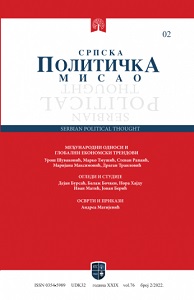АНАЛИЗА КОНЦЕПТА ИНКЛУЗИЈЕ У КОНТЕКСТУ ОБРАЗОВНЕ ПОЛИТИКЕ
ANALYSIS OF THE CONCEPT OF INCLUSION IN THE CONTEXT OF EDUCATIONAL POLICY
Author(s): Jovan BerićSubject(s): Politics / Political Sciences
Published by: Институт за политичке студије
Keywords: inclusive education; medical approach; social model; theoretical foundations; international documents; principles of inclusive education; integration
Summary/Abstract: The policy of inclusive education is part of a broader policy of creating a more inclusive, fairer, humane, tolerant and democratic society. Given that children through education adopt a number of attitudes that will shape their lives in the future, it is very important to adequately approach the process of inclusive education. Bearing in mind that in recent years there have been numerous discussions regarding the implementation of inclusive education, the purpose of this paper is to lay clear theoretical foundations, define the concept and remove ambiguities in relation to similar terms, in order to be able to formulate a clear education policy and take measures for its adequate implementation.Accordingly, in the first part of the paper, a distinction is made between the medical model and the social model, and then the theoretical directions and principles that can be considered as the forerunner of the concept of inclusion are considered. Sociocultural theory of Lev Vygotsky, social constructionism and systems theory were singled out as important theoretical predecessors, while developmental principles, the principle of least restrictive environment, the principle of normalization and social role valorization were singled out as important principles. In this context, international documents that form the basis for creating national inclusive education policies were also discussed. The key provisions of international documents that directly or indirectly talk about inclusive education are presented, and it was concluded that this reform is not just a matter of procedures and introduction of legislation, but it already represents a change in the awareness of all members of society about the needs of these children so that each individual can contribute to the creation of a better, fairer and more tolerant society.Bearing in mind that the purpose of this concept is to improve the position of marginalized groups through its operationalization and implementation, the last part of the paper clearly identifies key features of inclusive education, and a distinction is made in relation to the concept of integration. Referring to Stubb’s considerations as important elements (guidelines) for the implementation of the inclusion process, we singled out: a strong framework, which means that this process must be supported by appropriate values, beliefs and principles in society, then implementation tailored to local context and culture, avoiding rigid copying certain solutions and, finally, constant participation and review, which allows for the improvement of the system through the involvement of all stakeholders, continuous participation and monitoring, so that it can respond to changes.In addition to parents, professionals and teachers in schools, all other institutions and citizens as a whole must be involved in this process, and cooperate with each other. Inclusive education, as part of a broader process of creating an inclusive society, is not an ongoing process, but a permanent action and search for solutions that will improve the quality of education, social and emotional components of all children and people.The analysis of scientific literature, as well as international documents, leads to the conclusion that educational inclusion is a dynamic process that does not only include marginalized social groups through legal regulations in regular schools, but permanent work on adapting the environment and society to the needs of these groups. Therefore, this paper should contribute not only to the scientific community, but also to teachers and decision-makers in order to understand the concept better and pave the way for the implementation of educational policy. Education has great power, and the path that children go through during those most sensitive years will shape their lives later.
Journal: Српска политичка мисао
- Issue Year: 2022
- Issue No: 2
- Page Range: 165-189
- Page Count: 25
- Language: English, Serbian

